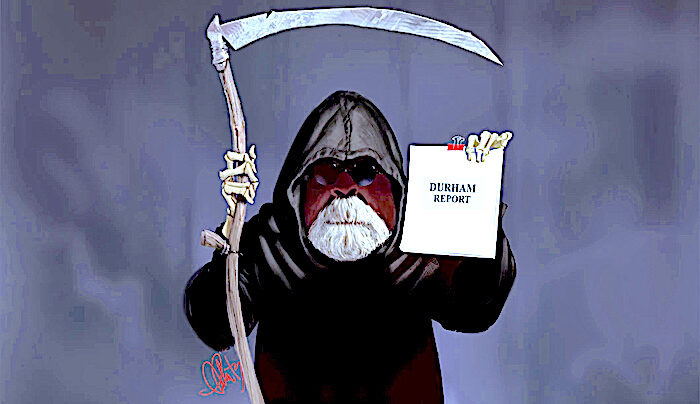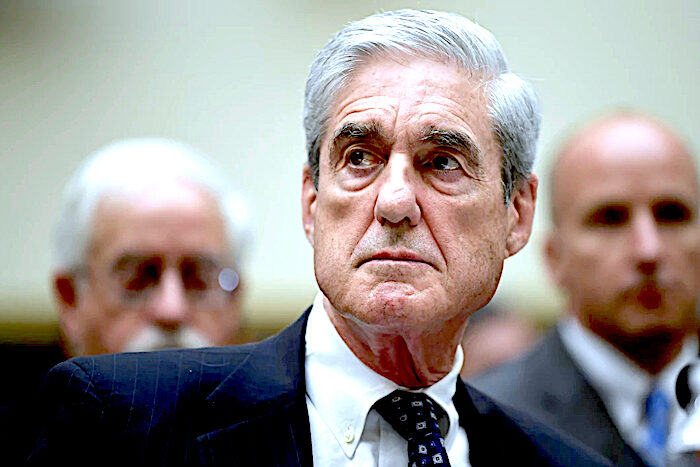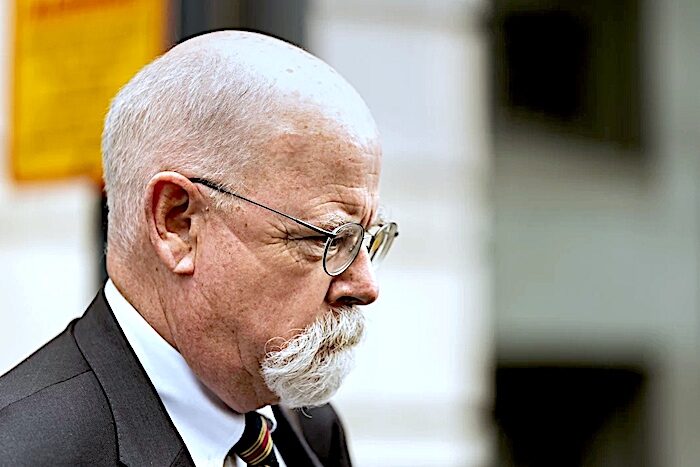Watergate also marked a sea change in how we held presidents accountable. Prior to his downfall, Nixon's sentiment that "if the president does it, it's not illegal" was to some extent the informal understanding, even if that sounds outrageous to contemporary ears. A corrupt president could either be impeached by Congress or thrown out of office by voters, but there was no constitutional middle ground to hold them accountable. Since Watergate, the FBI and the Department of Justice more broadly have increasingly found themselves in the awkward and untenable position of being subject to the president's constitutional authority while simultaneously being tasked with investigating White House corruption.
So 50 years on, the post-Watergate question remains: How is empowering the FBI and unelected deep-state bureaucrats to hold the president accountable working out for us?
With last week's release of special counsel John Durham's 306-page report into the origins and development of the Russia collusion investigation that engulfed Donald Trump's presidency, the question has been definitively answered. The corruption it has enabled has been calamitous, and no one in Washington seems to care about the truth anymore.
Thanks to the report, the public finally has a clear and reliable accounting of possibly the most complicated scandal in American history. The big-picture conclusions of the report sound almost understated:
"Senior FBI personnel displayed a serious lack of analytical rigor towards the information that they received, especially information received from politically affiliated persons and entities."But make no mistake, the details in the report that buttress those conclusions are devastating to the credibility of the FBI and those who championed the collusion investigation into Trump.
Take, for example, the story of the so-called Steele dossier and its origins, which is laid out in detail in the report. The Democratic National Committee and the Clinton campaign hired a disreputable opposition firm known as Fusion GPS, though the hiring was done using a law firm as a cutout so that they could hide their connection to Fusion GPS via attorney-client privilege. Once hired, Fusion GPS retained the services of former British intelligence agent Christopher Steele, who began compiling evidence of Trump's links to Russia via his supposedly extensive network of sources. But according to Durham's report, a single person, Igor Danchenko, claimed he "was responsible for 80% of the 'intel' and 50% of the analysis contained in the Steele Dossier."
Danchenko, a Russian citizen working at the Brookings Institution in Washington, had previously been the subject of counterintelligence by the FBI between 2009 and 2011. According to the Durham Report:
"In late 2008, while Danchenko was employed by the Brookings Institution, he engaged two fellow employees about whether one of the employees might be willing or able in the future to provide classified information in exchange for money."Despite this, the results of the counterintelligence investigation into Danchenko were inconclusive — after the FBI ended the investigation in 2011 having erroneously believed Danchenko had returned to Russia.
In other words, when the FBI repeatedly cited the Steele dossier as evidence to the Foreign Intelligence Surveillance Court in order to get warrants to spy on a future president, it was relying on the word of someone who may or may not be a Russian spy. Remember that the next time a government agency gives the people a lecture on succumbing to disinformation.
But the problems of the dossier are so much worse than that. Danchenko "maintained a relationship with Charles Dolan, a Virginia-based public relations professional." Dolan had worked with "key Russian government officials," and it was Dolan who supplied Danchenko with much of the information he gave to Steele. In fact, Dolan was the source of the dossier's infamous claim that Putin had "kompromat" on Trump in the form of a surreptitiously recorded video of him getting micturated on by Russian prostitutes.
However, Durham noted that in addition to working with the Russian government, Dolan "had previously held multiple positions and roles in the Democratic National Committee ('DNC') and the Democratic Party." So, the two biggest sources of the dossier were a possible Russian spy and a former employee of the DNC, the entity ultimately paying for the creation of the dossier.
To put the final capstone on this dispiriting mix of corruption and credulity, in March of 2017, long after the FBI had tried and failed to prove the accuracy of the dossier and had good reason to believe Danchenko had lied to the bureau, Durham noted that the FBI hired Danchenko as a "confidential human source" and paid him $220,000 over the next 3 1/2 years. Why? The FBI bought his silence. If Danchenko were forced to answer questions publicly about the dossier, it would be humiliating for the FBI. As long as Danchenko was on the FBI payroll, he was not subject to congressional oversight due to policies preserving the secrecy of FBI investigation "sources and methods."
Elsewhere in the report, Durham spends a good deal of time discussing the FBI's use of another confidential human source who played a major role in launching the "Crossfire Hurricane" investigation. Though "CHS-1" in the Durham report isn't named, the informant has been widely identified as an American professor at the University of Cambridge named Stefan Halper, who was also paid hundreds of thousands for his services by the government. Halper has a checkered history, to put it mildly, playing a notable role in two major Reagan administration scandals: Iran-Contra and the theft of Jimmy Carter's presidential debate briefing book from the White House. In addition to that, Halper's been arrested on charges of possessing crack cocaine and has apparently lied about several major professional accomplishments, including being a Fulbright scholar, having a doctorate from the University of Oxford, and working at the White House.
The Trump-Russia investigation was reportedly opened after George Papadopoulos, a Trump campaign foreign policy adviser, allegedly said something to the effect that the Trump campaign believed Russia had dirt on Hillary Clinton. The Durham report noted that when the evidence used to open the investigation was presented to British intelligence, "the British could not believe the Papadopoulos bar conversation was all there was" and a senior British intelligence officer told the FBI's U.K. legal attache that he was "openly skeptical [and] said the FBI's plan for an operation [to investigate Papadopoulos] made no sense."
In order to gather more evidence, the FBI then used Halper to pay Papadopoulos and Carter Page, another Trump adviser with experience working in Russia, to come to Cambridge on academic pretenses. Afterward, the FBI played British intelligence recordings Halper had made of Page. According to the Durham report, the reaction from one British intelligence counterpart to the tapes was blunt: "For [expletive] sake, man. You went through a lot of trouble to get him to say nothing."
The Durham report's summary of the revelations gleaned from Halper's "spycraft" is enraging.
"The FBI's own records and the recordings establish that Page made multiple exculpatory statements to the individual identified as CHS-I [Halper] but the Crossfire Hurricane investigators failed to make that information known to the Department attorneys or to the FISC [Foreign Intelligence Surveillance Court]. Page also made explicit statements refuting allegations contained in the Steele reporting. ... Similarly, multiple recordings of Papadopoulos were made by CHS-1 and a second CHS, in which Papadopoulos also made multiple exculpatory statements that were not brought to the attention of the Department lawyers or the FISC."And yet, not only did the FBI continue aggressively pursuing the Trump-Russia investigation, but in the fall of 2017, Papadopoulos pleaded guilty to lying to the FBI and served 12 days in jail, a plea deal he was only offered in exchange for cooperating with the Mueller investigation and that likely saved him from having to pay hundreds of thousands in legal fees. The Mueller report would eventually conclude that Papadopoulos had no untoward contact with Russians or any knowledge of dirt on Clinton. Papadopoulos has steadfastly maintained he was a victim of entrapment, and it's hard to fault him for thinking that. (Page was never charged with anything, though the press spent years smearing the Naval Academy graduate by suggesting he was a Russian agent.)
When British intelligence was later asked for help cooperating with the Mueller investigation, the Durham report noted that MI6, which had immediately and correctly surmised that the Trump-Russia allegations were predicated on nothing, told the FBI "there was no [expletive] way in hell they were going to do it." That was a wise decision, as the Durham report also provided fairly definitive evidence that the Mueller investigation was corrupt. A section of the report is dedicated to two people working on the Mueller investigation who expressed concerns about political bias in the investigation after the Mueller team declined to investigate Dolan and his relationship with Danchenko and the dossier. Doing so would have kicked the legs out from under the various collusion and obstruction of justice charges the Mueller team was desperate to prove.
And yet, the Mueller report has been essential to the desperate media spin that the Durham report is a dud that can safely be ignored. Compared to the Durham report, the Atlantic's David Frum noted, "Mueller's investigation produced some three dozen indictments, seven guilty pleas, and one conviction at trial." But the majority of those indictments were for Russians in absentia, and the rest of them were for dramatically lesser charges than treasonous collusion with Russia to steal an election, which is what people were all but assured the Mueller team would uncover.
The idea that the validity of what these reports tell us should be judged by the number of convictions secured is nothing but a depressing exercise in raw power. The fact that Durham failed on this score tells us a lot about the priorities of the Justice Department and partisan elements of the judiciary but little about the truth. Mueller was able to strong-arm guilty pleas from campaign flunkies such as Papadopoulos for not speaking carefully enough, but last year, Durham was unable to secure a conviction against Danchenko for blatantly lying to the FBI. To give you an idea of what Durham was up against, the judge threw out one of the key charges against Danchenko because when he told the FBI that he had not talked to Dolan, the evidence presented contradicting this was in the form of written emails, which did not meet the literal definition of physically talking to someone.
Ultimately, the most damning thing about the Durham report is that it makes no specific recommendations to stop something such as the Trump-Russia abomination from happening again. This may seem like a strange place to arrive at, given the voluminous corruption he documented. However, Durham's report repeatedly noted how the FBI showed extreme caution investigating anything related to Hillary Clinton's prodigious corruption and gave her campaign "defensive briefings" when it believed a foreign entity might be attempting to influence her campaign — a marked difference between the aggressive and clandestine efforts to target the Trump campaign.
If federal law enforcement and bureaucrats are going to choose willfully to employ gross partisan double standards and ignore the existing policies and are generally incapable of restrained and prudent judgment, Durham sees no point in putting new guardrails in place.
Durham concluded:
"The promulgation of additional rules and regulations to be learned in yet more training sessions would likely prove to be a fruitless exercise if the FBI's guiding principles of 'Fidelity, Bravery and Integrity' are not engrained in the hearts and minds of those sworn to meet the FBI's mission of 'Protect[ing] the American People and Uphold[ing] the Constitution of the United States.'"In the decades since Nixon resigned, it appears our understanding of presidential accountability has gone from "if the president does it, it's not illegal" to "if the FBI wants to engage in a baseless investigation motivated by partisan animus to frame a legitimately elected president as a foreign traitor, it's not illegal."
And this state of affairs seems far, far worse than Watergate.






How do you know it is a narrative? By what it does not include: conspiracy, corruption at the highest levels of government, treason to the USA, illegal surveillance and illegal actions taken by the FBI, lying and deception, the elimination of potential informants.
If I paraphrase the narrative to the "American sheeple", we finally know the truth. We need a new Warren commission to make thousands of pages of "cover-up" and "recommendations" and identify the "clerk" in accounting that was responsible for this "catastrophe" and incarcerate them.